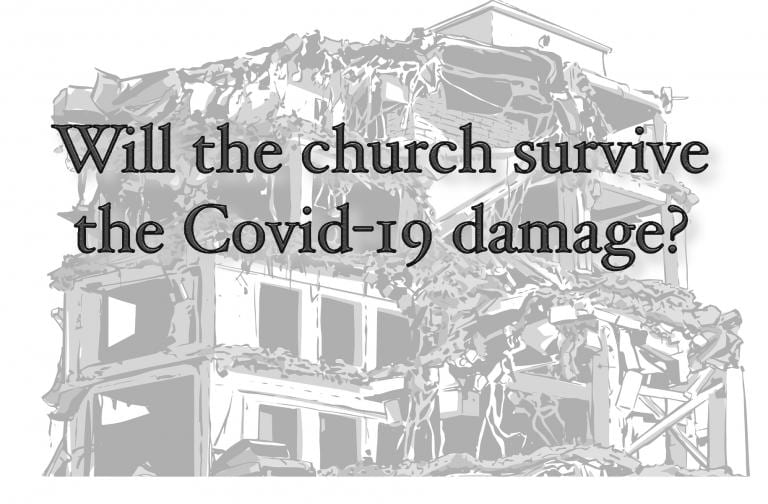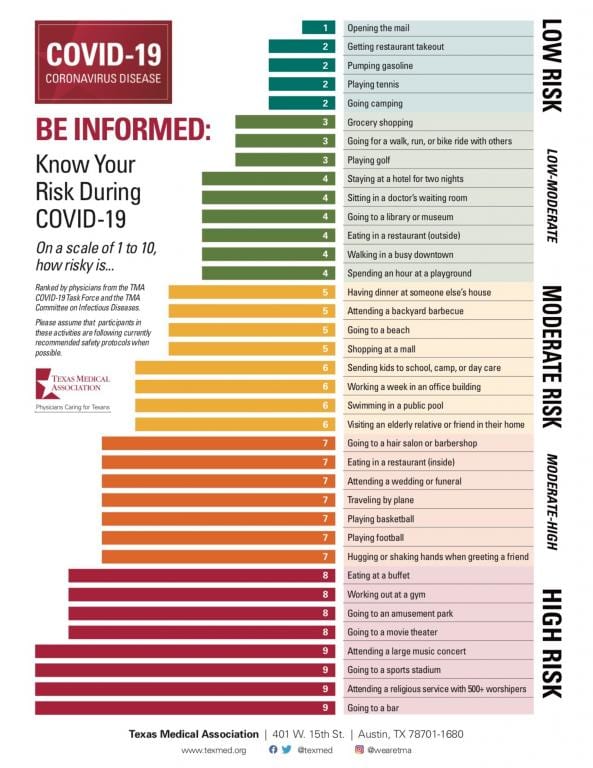SEPTEMBER 4, 2020 BY CHRISTY THOMAS

I continue to ponder the long-term aftereffects of the Covid-19 pandemic on the health, and even survival, of churches. Will it survive the Covid-19 damage?
As an avid reader of business news, I am aware that, while some businesses are thriving because of the crisis, myriads of others are going under. Many of these are small businesses, although there has been an alarming number of large-company bankruptcies as well. Keep in mind: when any company goes under, it’s failure impacts all employees.
Here’s one example from very, very early in the crisis: A popular farm-to-table restaurant in Atlanta, Ga, found itself down to $6000 in cash as people stopped coming to restaurants (at that point, Atlanta had not mandated that they close). No longer able to keep going, they laid off all but two of their dozen employees. Here’s the chain reaction of that one tiny event:
Laid-off waitress Casey Brazell is putting off her dream to buy a new house. A family farm where Table 20 buys most of its greens is left without orders. The restaurant’s bank is losing revenue as it gives breaks to dozens of businesses. Its credit-card processor in Arizona has frozen its hiring. A tech company in San Francisco is waiving fees for Table 20 and scores of other clients.
Will the church survive the Covid-19 damage?
What does this matter to the church? I wrote about this earlier this spring when the stock market went into a temporary free-fall, and will repeat it here. What happens to the broader US economy has a giant impact on whether the current model of the US church will survive.
It always bears repeating: the bustling economy that the US longs for, and occasionally experiences, arrives at times of low unemployment, meaning more people have more money to spend on consumer products.
We are NOT a manufacturing economy; we ARE a consumer economy. That means that people have to buy the often-derided STUFF for money to stay in circulation. The moment folks in the US stop buying things, homes, vacations, experiences, entertainment, etc., personal income starts dropping. When personal income decreases, giving to churches and other charitable institutions also decreases.
To make things worse, church gatherings and traditional methods of worship sit high on the charts of the most dangerous places to be during the epidemic. Check out this ranking from the Texas Medical Association of hazardous gathering places. Large church meetings hit the second most dangerous place to be, ranking just below going to a bar, and worse than being part of a large sporting event.
With most churches non-endowed and heavily dependent upon the offering plate/electronic giving methods to pay the monthly bills, church buildings themselves may end up becoming a costly liability. Their upkeep is often a significant cost factor in church budgets.
Are clergy ready to quit?
Now, I stay in admiration of what clergy and their staffs are doing to keep people connected to their worship life and to continue to serve their communities. But I also recently read this blog about why clergy are so deeply discouraged and could be close to quitting. I suspect it hit home with many.
Two big reasons for the discouragement? Well, clergy workloads have increased greatly, AND the criticisms of their performances have also increased far past the usual. Plus, they see the numbers and know how precarious church finances are at the moment.
While I firmly believe that the redemptive movement of God will not cease, and the church is the hands and feet of that movement, the current form of doing church will likely have to change radically.
What thrives in a crisis?
To go back to business news, the firms that are currently thriving are those that make ways for people to stay connected with each other and to remain productive at work. Others that are doing well are remote or “ghost” kitchens and delivery services for those who have excelled at online marketing. Keep in mind: likely, the epidemic will also kill the local shopping malls as people become more adept at purchasing as much as possible online.
A quick and dirty summary: the organizations that will survive and thrive during and after the pandemic are those with a great deal of flexibility and that do not require a great deal of face-to-face contact, just about the opposite description of most churches and indeed of most denominational structures.
In particular, will The United Methodist Church survive?
In my beloved world of United Methodism, the financial bleeding is already evident. Here is a good summary of what the general church agencies, funded totally by local church giving and the apportionments assigned each church, expect with their future budgets and the impact of their work.
Keep in mind that apportionment payments are going to be routinely shorted this year because of the decline of local church giving. Add to this the fractious nature of our connection with the growing likelihood of a split . . . I find myself taking a deep, deep breath as sadness overtakes me.
And yet, I must be positive there. We have before us one of those times of extreme societal upheavals. The world will emerge radically changed from this world-wide pandemic, as has happened after every historic pandemic of this magnitude.
In these times of upheaval, people discover ears alert to new sounds, eyes aware of major injustices, and souls sensitive to new awakenings.
So will the church survive the Covid-19 damage? Probably not, certainly in its current form. But the massive uncertainties that just about the entire world now faces also call for massive infusions of hope, service, and rebirth.
If there were ever a time for the essential message of the gospel, of our free and full reconciliation with the Holy One and the grace and forgiveness and new days flowing from that Holy Presence, it is now.
Let us not miss this time, even as we must acknowledge the tremendous structural losses before us.
Never forget: when the Bible says that we were created in the image of God, that very image means that we are indeed creative people, able to do what God did: bring beauty and order out of chaos. That is now our job: a holy and worthy calling.
Photo Credits::
Illustration 173405498 © Robertzsombori – Dreamstime.com,, modified by Christy Thomas
Courtesy of the Texas Medical Association

